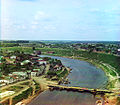Volga
The Volga is the longest river in Europe.[13] In Russian it is called Волга, in the Tatar language its name is İdel.
| Volga Волга (Russian) | |
|---|---|
 The Volga at Yaroslavl | |
 Map of the Volga drainage basin | |
| Etymology | Proto-Slavic *vòlga "wetness" |
| Location | |
| Location | Eastern Europe |
| Country | Russian Federation |
| Cities | Tver, Yaroslavl, Nizhny Novgorod, Cheboksary, Kazan, Ulyanovsk, Samara, Saratov, Volgograd, Astrakhan |
| Physical characteristics | |
| Source | |
| - location | Valdai Hills, Tver Oblast |
| - coordinates | 57°15′4.7″N 32°28′5.1″E / 57.251306°N 32.468083°E |
| - elevation | 228[1] m (748 ft) |
| Mouth | Caspian Sea |
| - location | Astrakhan Oblast |
| - coordinates | 45°50′N 47°58′E / 45.833°N 47.967°E[2] |
| - elevation | −28[1] m (−92 ft) |
| Length | 3,531 km (2,194 mi)[3] |
| Basin size | 1,360,000 km2 (530,000 sq mi)[3] 1,404,107.6 km2 (542,129.0 sq mi)[6] |
| Discharge | |
| - location | Astrakhan (Basin size: 1,391,271.8 km2 (537,173.0 sq mi) |
| - average | 8,060 m3/s (285,000 cu ft/s)
8,103.078 m3/s (286,157.5 cu ft/s)[4] Volga Delta: 8,110.544 m3/s (286,421.2 cu ft/s)[5] |
| - minimum | 5,000 m3/s (180,000 cu ft/s) |
| - maximum | 48,500 m3/s (1,710,000 cu ft/s) |
| Discharge | |
| - location | Volgograd (Basin size: 1,359,396.8 km2 (524,866.0 sq mi) |
| - average | 8,150 m3/s (288,000 cu ft/s) 8,228.298 m3/s (290,579.6 cu ft/s)[7] |
| - minimum | 5,090 m3/s (180,000 cu ft/s) |
| - maximum | 48,450 m3/s (1,711,000 cu ft/s) |
| Discharge | |
| - location | Samara (Basin size: 1,218,995.3 km2 (470,656.7 sq mi) |
| - average | 7,680 m3/s (271,000 cu ft/s) 7,785.921 m3/s (274,957.2 cu ft/s)[8] |
| Discharge | |
| - location | Nizhny Novgorod (Basin size: 479,637.3 km2 (185,189.0 sq mi) |
| - average | 2,940 m3/s (104,000 cu ft/s)
2,806.467 m3/s (99,109.4 cu ft/s)[9] Yaroslavl (Basin size: 153,657.8 km2 (59,327.6 sq mi): 1,008.277 m3/s (35,607.0 cu ft/s)[10] Rybinsk (Basin size: 150,119.8 km2 (57,961.6 sq mi): 993.253 m3/s (35,076.4 cu ft/s)[11] |
| Discharge | |
| - location | Tver (Basin size: 24,658.6 km2 (9,520.7 sq mi) |
| - average | 176 m3/s (6,200 cu ft/s) 186.157 m3/s (6,574.1 cu ft/s)[12] |
| Basin features | |
| Tributaries | |
| - left | Kama |
| - right | Oka |
Many people see it as the national river of Russia. It flows through the western part of the country. It is Europe's longest river, with a length of 3,530 kilometres,[14] and forms the core of the largest river system in Europe.
It rises in the Valdai Hills of Russia, 225m above sea level north-west of Moscow. The Kama, Oka, Vetluga and the Sura are its main tributaries. The Volga and its tributaries form the Volga river system, which drains an area of about 1.35 million square kilometres in Russia. The Volga Delta has a length of about 160 kilometres. It includes 555 channels and small streams. It is the largest estuary in Europe. It is the only place in Russia where pelicans, flamingoes, and lotuses may be found. The Volga freezes for most of its length for three months each year. Some of the biggest reservoirs in the world can be found along the river. The Volga is in the Volga region.
-
Rzev is the first town on the banks of the Volga. Photo from the early 20th century
-
The Volga, near Ulyanovsk
-
Satellite image of the Volga
-
Volga in Yaroslavl
References
change- ↑ 1.0 1.1 Scheffel, Richard L.; Wernet, Susan J., eds. (1980). Natural Wonders of the World. United States of America: Reader's Digest Association, Inc. pp. 406. ISBN 0-89577-087-3.
- ↑ Volga at GEOnet Names Server
- ↑ 3.0 3.1 «Река Волга» Archived 2016-03-05 at the Wayback Machine, Russian State Water Registry
- ↑ "Rivers Network". 2020. Archived from the original on 2023-01-09. Retrieved 2022-08-01.
- ↑ "Rivers Network". 2020. Archived from the original on 2023-01-09. Retrieved 2022-08-01.
- ↑ "Rivers Network". 2020. Archived from the original on 2023-01-09. Retrieved 2022-08-01.
- ↑ "Rivers Network". 2020. Archived from the original on 2023-01-09. Retrieved 2022-08-01.
- ↑ "Rivers Network". 2020. Archived from the original on 2023-01-09. Retrieved 2022-08-01.
- ↑ "Rivers Network". 2020. Archived from the original on 2023-01-09. Retrieved 2022-08-01.
- ↑ "Rivers Network". 2020. Archived from the original on 2023-01-09. Retrieved 2022-08-01.
- ↑ "Rivers Network". 2020. Archived from the original on 2023-01-09. Retrieved 2022-08-01.
- ↑ "Rivers Network". 2020. Archived from the original on 2023-01-09. Retrieved 2022-08-01.
- ↑ "The Volga River". Rivers of Life. Center for Global Environmental Education - Hamline University Graduate School of Education. 2001. Archived from the original on 2008-10-17. Retrieved 2008-10-24.
- ↑ "Volga Longest River In Europe". ArrestedWorld. Archived from the original on 2020-10-27. Retrieved 2020-10-28.
Other websites
changeMedia related to Volga River at Wikimedia Commons



